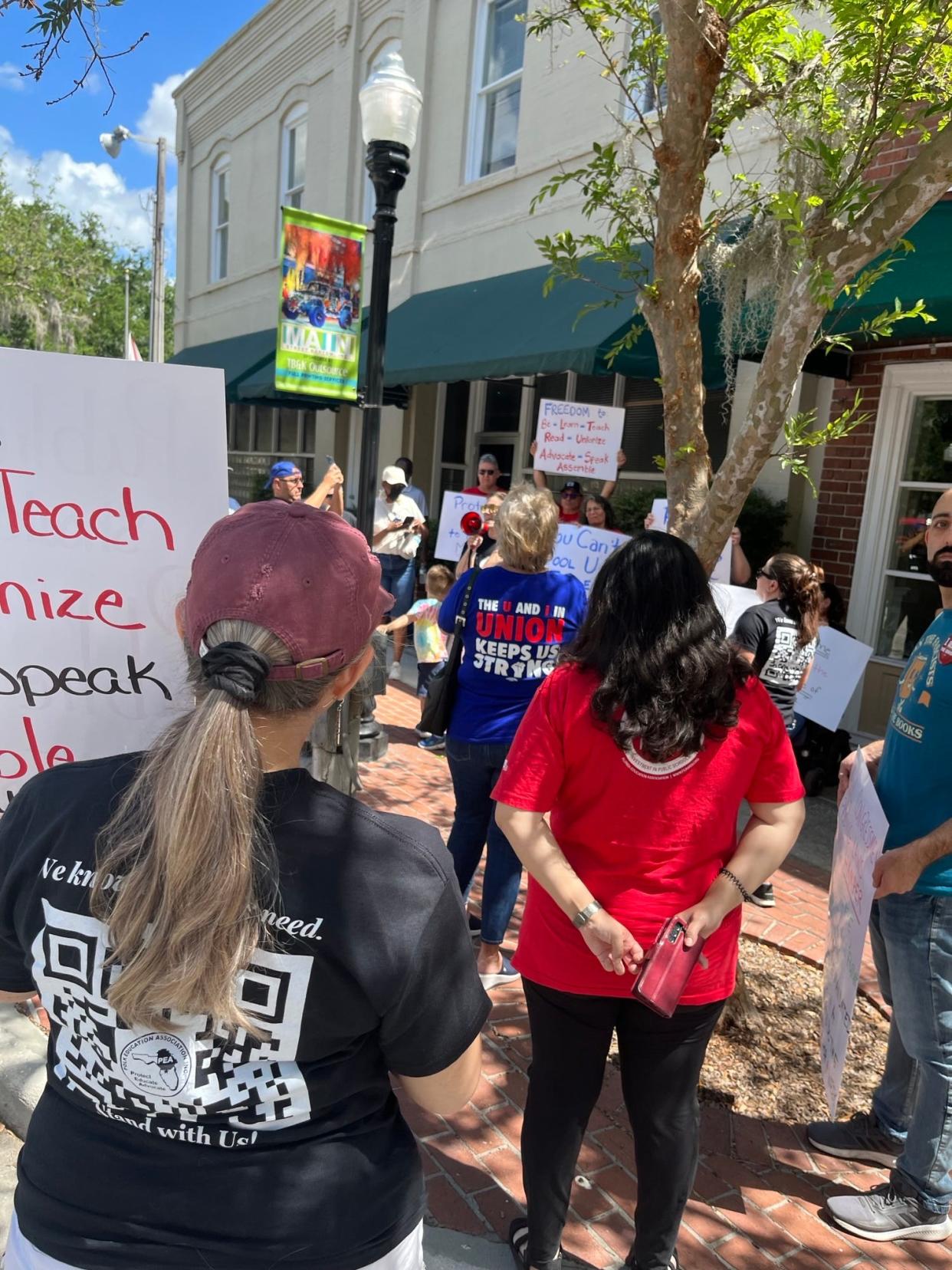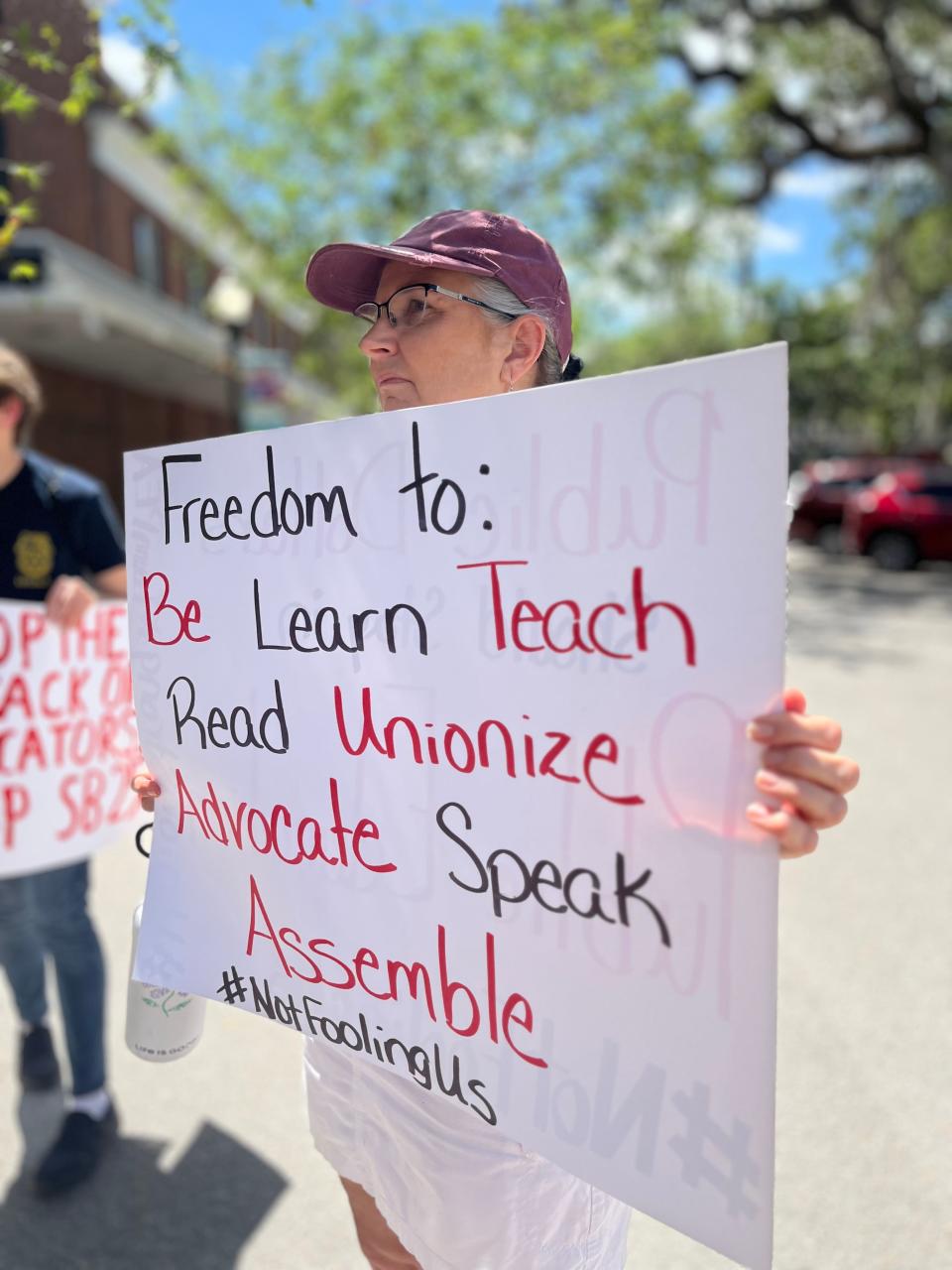After vouchers become law, Polk teachers try to turn up pressure

- Oops!Something went wrong.Please try again later.
Days after Gov. Ron DeSantis signed a sweeping expansion of private-school vouchers, a group of teachers from Polk and other nearby counties held a rally in front of Sen. Ben Albritton's Bartow office on April 1, trying to turn up pressure on Polk's legislators.
Members of Polk's teachers' union, the Polk Education Association, were joined by teachers' unions from Hillsborough and Charlotte counties to show their displeasure for HB 1, the voucher bill that DeSantis signed on March 28. But they were also hoping to thwart another another bill, House Bill 1445, targeting many public-sector unions. That bill brought support from other labor activists, such as postal workers and Teamsters.
“Let’s be very clear here,” PEA President Stephanie Yocum said to the crowd through a megaphone. “This is about taking away our individual freedoms to be, to teach, to learn. For our kids to be in a place and a space that accepts them and meets them where they’re at and gives them a quality public education. That’s what this is about.”
'Why don't we privatize law enforcement?'
Yocum encouraged protesters to leave postcards for Albritton detailing what they want him to hear.
Johnny Green, 54, vice president of the Hillsborough Classroom Teachers Association, said, “I want Albritton to know I’m listening. I want him to know I’m watching to see what he’s going to do."
Speaking specifically about the new voucher law, Green said, "if it’s such a good bill, why don’t we privatize law enforcement? Privatize fire departments? Let’s give them a voucher bill. All this is union busting to hurt unions, to hurt public education as we know it.”
Jim Palmer, a math teacher at Scott Lake Elementary, said he worried about standards at private schools.
“I expect higher rigor in my classroom,” Palmer said. “I hold my kids to the highest expectations. I don’t dumb anything down. I teach the Florida state standards, and right now they are the best standards.”
'Anti-freedom' Labor leaders push Polk lawmakers to oppose legislation targeting unions
Embattled school Impassioned pleas convince Polk School Board to renew charter school for 5 years
Statewide protests LGBTQ students demonstrate outside Lakeland High School
It was a sentiment shared by Andrew Spar, president of the Florida Education Association, the statewide organization representing approximately 150,000 teachers and educational staff. Spar said private schools lack transparency and accountability.
“These voucher schools do not have to report what their curriculum is to parents. They don’t have to tell parents if their teachers are certified or even degreed. They don’t have to tell parents anything," he said. "There are over 1,300 pages of laws governing public schools and barely any governing private schools and voucher schools.”
But he said his biggest concern is the price tag, estimated at $4 billion.
“And that’s money that is coming out of public schools because it will be giving the wealthiest Floridians, the millionaires and billionaires that already send their kids to affluent private schools the ability to get a voucher. While 85% of Florida’s children attend public schools, this is really an attempt to divert dollars away from public schools.”
Albritton, who was in Tallahassee for the legislative session and unavailable the day of the rally, spoke with The Ledger a few days later.
“If they say, you know, this is simply a bill to send money from public schools to private schools, I would say, ‘What are you afraid of?’” he said. “If there is some competitive disadvantage that you have as a public school system that would not allow you to be competitive, or the charter system, or private school – tell me what that is and we’ll get rid of it.”
Ultimately, he said it comes down to parental choice.

“This is the most substantial empowerment of parents we have seen in the state of Florida,” Albritton said. “We pass laws up here that are good for parents and children. I thought that’s what our public school system, private school systems – school systems as a whole – are supposed to be about.
"At the end of the day, do I believe that we should be supportive of our public school teachers? Yes. And I have many in my family. But when it’s said and done, the most important thing to focus on is the education of the child in support of the parents of that child.”
'It's our voice'
While the protest against vouchers came four days after they were signed into law, many in the crowd were hoping they still had a chance to change minds on the union bill.
House Bill 1445 would block the automatic deduction of dues from the paychecks of employees in certain public-sector unions, exempting unions for police officers, firefighters and corrections officers. The bill limits the salaries of union officials, demands that unions reiterate on dues forms that membership is voluntary, adds several reporting requirements to the state and mandates that the unions would be forced to fold if membership dropped below 60% of eligible employees.
A similar bill, SB 256, already passed the Senate. As of this week, the House version was before the State Affairs Committee.
“It’s our voice. It’s our voice in our workplace. It’s our voice with our employer. It’s our voice to move educational policy that benefits kids," Yocum, the PEA president, told the rally. "Governor DeSantis wants to crush that to gain political points with a base that will propel him to the White House.”
Elizabeth Rasmussen, a 36-year-old social studies teacher at Bartow High School, said she feels like legislators aren't listening.
“If we turn, say, a 100-page union contract into a two-page contract, we’re taking away the voice of our teachers, our secretaries, the people who run our schools,” Rasmussen said. “That’s going to hurt the kids if we can’t have a duty-free lunch. Or not have a planning period guaranteed.”
Many at the rally questioned why SB256 appears to be targeting predominantly female unions.
“It’s directed at public-sector nurses,” Palmer said. “It’s directed at FEA being the largest union. They purposely carved out the police and the firefighters, which are predominantly male industries. It’s sexist.”
Albritton called the Senate's version of the bill a “union accountability bill.”
“Unions deserve to have the same accountability as any other organization that is responsible for exercising a first amendment right,” he said.
And responding to accusations that the bills are sexist, Albritton said the accusations were untrue and that there's a distinction between the education and law enforcement industries.
“Most of this is political theatre. And that’s a fact," he said. "We’re doing what’s best for families and children. Maybe some people get upset over that. But I’m not going to change my direction based on negative comments. I’m for Florida’s children, number one.”
This article originally appeared on The Ledger: After vouchers become law, Polk teachers try to turn up pressure

